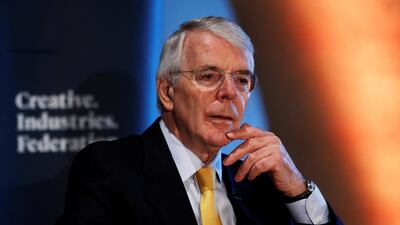Former British Prime Minister Sir John Major called on Wednesday for a free vote in parliament on whether to reject any deal negotiated with the European Union, warning the current plans are "bad politics" that will damage the economy.
Sir John, who campaigned to stay in the EU, said it must be parliament, not the government, that makes the final decision on any new deal with the EU, and that there is an argument for a second referendum on any such deal.
Any vote on the final Brexit deal is of such national importance that politicians should be allowed to vote according to their consciences, he said.
"This must be a decisive vote, in which parliament can accept or reject the final outcome or send the negotiators back to seek improvements, or order a referendum," Sir John, 74, said in a speech in central London.
"Brexit is a unique decision. It will affect the lives of the British people for generations to come. If it flops – there will be the most terrible backlash."
_______________
Read more:
EU disagrees with UK over Brexit transition period
Beware moves to break up UK after Brexit, minister warns
_______________
Opponents of Brexit are trying to garner enough support in the lower house of parliament, the House of Commons, to block any possible withdrawal deal Prime Minister Theresa May brings back from Brussels in October.
Blocking any deal the government manages to clinch with the EU could plunge British politics into crisis with uncertain consequences for Brexit, for the world's sixth largest economy, and for the fate of London, the only global financial hub to rival New York.
Sir John's own 1990-1997 premiership was plagued by disputes within his party over Europe, including Britain's ignominious withdrawal from the European Exchange Rate Mechanism, the predecessor to the single currency, in 1992.
At the same time as calling for parliament to have a final say on Brexit, Sir John savaged his party's own handling of the negotiations.
Sir John accused the ruling Conservatives of putting party interests above the national interest by imposing red lines on the negotiations and said this means the party risks losing the support of business leaders over its approach.
"I know of no precedent for any government enacting a policy that will make both our country and our people poorer," he said. "This is not only grand folly. It's also bad politics."
Sir John, who as prime minister helped begin the peace process in Northern Ireland in the 1990s, also hit out at recent calls to ignore the dangers of imposing a hard border on the island of Ireland.
"We need a policy to protect the Good Friday Agreement – and we need one urgently," he said. "And it is our responsibility to find one – not the European Union."

